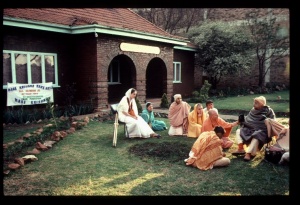CC Madhya 8.183-184 (1975): Difference between revisions
(Vanibot #0027: CCMirror - Mirror CC's 1996 edition to form a basis for 1975) |
(Vanibot #0020: VersionCompareLinker - added a link to the Version Compare feature) |
||
| Line 2: | Line 2: | ||
<div style="float:left">'''[[Sri Caitanya-caritamrta (1975)|Śrī Caitanya-caritāmṛta (1975)]] - [[CC Madhya (1975)|Madhya-līlā]] - [[CC Madhya 8 (1975)|Chapter 8: Talks Between Śrī Caitanya Mahāprabhu and Rāmānanda Rāya]]'''</div> | <div style="float:left">'''[[Sri Caitanya-caritamrta (1975)|Śrī Caitanya-caritāmṛta (1975)]] - [[CC Madhya (1975)|Madhya-līlā]] - [[CC Madhya 8 (1975)|Chapter 8: Talks Between Śrī Caitanya Mahāprabhu and Rāmānanda Rāya]]'''</div> | ||
<div style="float:right">[[File:Go-previous.png|link=CC Madhya 8.182 (1975)|Madhya-līlā 8.182]] '''[[CC Madhya 8.182 (1975)|Madhya-līlā 8.182]] - [[CC Madhya 8.185 (1975)|Madhya-līlā 8.185]]''' [[File:Go-next.png|link=CC Madhya 8.185 (1975)|Madhya-līlā 8.185]]</div> | <div style="float:right">[[File:Go-previous.png|link=CC Madhya 8.182 (1975)|Madhya-līlā 8.182]] '''[[CC Madhya 8.182 (1975)|Madhya-līlā 8.182]] - [[CC Madhya 8.185 (1975)|Madhya-līlā 8.185]]''' [[File:Go-next.png|link=CC Madhya 8.185 (1975)|Madhya-līlā 8.185]]</div> | ||
{{CompareVersions|CC|Madhya 8.183-184|CC 1975|CC 1996}} | |||
{{RandomImage}} | {{RandomImage}} | ||
| Line 10: | Line 11: | ||
:yāṅra saubhāgya-guṇa vāñche satyabhāmā | :yāṅra saubhāgya-guṇa vāñche satyabhāmā | ||
:yāṅra ṭhāñi kalā-vilāsa śikhe vraja-rāmā | :yāṅra ṭhāñi kalā-vilāsa śikhe vraja-rāmā | ||
:yāṅra saundaryādi-guṇa vāñche lakṣmī-pārvatī | :yāṅra saundaryādi-guṇa vāñche lakṣmī-pārvatī | ||
:yāṅra pativratā-dharma vāñche arundhatī | :yāṅra pativratā-dharma vāñche arundhatī | ||
| Line 25: | Line 27: | ||
<div class="translation"> | <div class="translation"> | ||
"Even Satyabhāmā, one of the queens of Śrī Kṛṣṇa, desires the fortunate position and excellent qualities of Śrīmatī Rādhārāṇī. All the gopīs learn the art of dressing from Śrīmatī Rādhārāṇī, and even the goddess of fortune, Lakṣmī, and the wife of Lord Śiva, Pārvatī, desire Her beauty and qualities. Indeed, Arundhatī, the celebrated chaste wife of Vasiṣṭha, also wants to imitate the chastity and religious principles of Śrīmatī Rādhārāṇī. | |||
</div> | </div> | ||
Latest revision as of 19:53, 27 January 2020

A.C. Bhaktivedanta Swami Prabhupada
TEXTS 183-184
- yāṅra saubhāgya-guṇa vāñche satyabhāmā
- yāṅra ṭhāñi kalā-vilāsa śikhe vraja-rāmā
- yāṅra saundaryādi-guṇa vāñche lakṣmī-pārvatī
- yāṅra pativratā-dharma vāñche arundhatī
SYNONYMS
yāṅra—whose; saubhāgya—of good fortune; guṇa—quality; vāñche—desires; satyabhāmā—Satyabhāmā, one of the queens of Kṛṣṇa; yāṅra ṭhāñi—from whom; kalā-vilāsa—the sixty-four arts; śikhe—learn; vraja-rāmā—all the gopīs in Vṛndāvana; yāṅra—whose; saundarya-ādi—such as beauty; guṇa—qualities; vāñche—desires; lakṣmī—the goddess of fortune; pārvatī—the wife of Lord Śiva; yāṅra—whose; pati-vratā—of chastity; dharma—principle; vāñche—desires; arundhatī—the wife of Vasiṣṭha Muni.
TRANSLATION
"Even Satyabhāmā, one of the queens of Śrī Kṛṣṇa, desires the fortunate position and excellent qualities of Śrīmatī Rādhārāṇī. All the gopīs learn the art of dressing from Śrīmatī Rādhārāṇī, and even the goddess of fortune, Lakṣmī, and the wife of Lord Śiva, Pārvatī, desire Her beauty and qualities. Indeed, Arundhatī, the celebrated chaste wife of Vasiṣṭha, also wants to imitate the chastity and religious principles of Śrīmatī Rādhārāṇī.